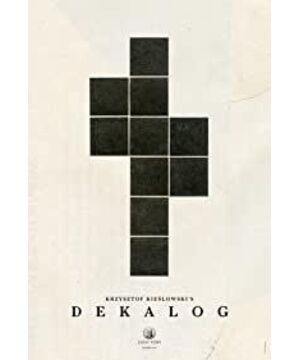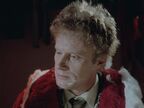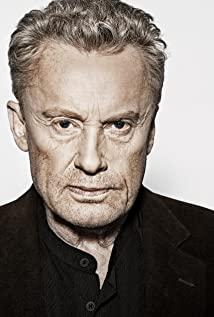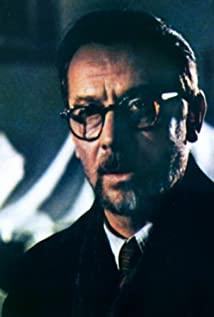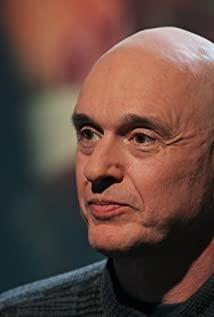- Interpretation of
"The Ten Commandments" is a TV series filmed by Polish director Krzysztof Kieslowski in 1987. In these short films, he shows the confusion and confusion of modern people with ten short stories, and gives the audience the important task of reflecting on the living conditions of modern people. As a "philosopher who uses film language to describe the state of individual existence", Kieslowski, in "The Impermanence of Life", the first part of "The Ten Commandments", described the accident and absurdity of life, the conflict between religion and science as a tragic story displayed in the form.
1
The plot of "The Ten Commandments: The Impermanence of Life" does not have too many ups and downs, and the audience feels a heavy and depressing feeling from the beginning of the film, which has become the basic style of the film. At the beginning of the film, a ragged homeless man sits alone in a snowstorm, curled up beside the fire, in a field of ice and snow. In the vast world, only he stayed there alone, and a sense of loneliness and confusion flooded the audience's hearts. Then, the camera switched to a middle-aged woman. She stared at the screen and silently watched a group of children play happily. In the end, the image was frozen on the face of a little boy with the warmest smile, but the woman's eyes were blurred by tears. The audience knows that there must be a story in there. Immediately after, the tramp appeared again, the environment did not change, but the tramp wiped his eyes, like crying, arousing our reverie.
The camera cuts again, and a group of pigeons are flying towards a residential building. Among them, a gray pigeon landed on the windowsill of a house and looked inward curiously. The face of a little boy was reflected on the glass. This is the story. Protagonist - Poway. Poway's kindly, curious eyes, full of innocence, made people instantly like him. Revolving around the little boy Poway, the film tells that he is smart and naive, likes science like his father, and often takes scientific calculation for pleasure and regards it as a part of life. However, when the little boy tried his best to figure out the math problem, he happily went shopping, but saw a dead dog, he was suddenly confused - life is impermanent, how can science be accurate and powerful? With doubts, he asked his father and Aunt Elena. The former spoke of death with academics, denying the soul and God, while the latter explained life with religion, taking God as meaning and consolation. The little boy didn't understand what life was, he still believed in science. When he couldn't wait to wear the roller skates his parents had given him to play on the ice, which his father had demonstrated to be completely safe, something unfortunate happened, the ice broke and the boy drowned. I went to church, and after some venting, I fell into sadness and despair.
The plot of the whole film is simple, but the overall heavy atmosphere and the contrast of the little boy's experience before and after let us turn our perspective to the important proposition that the director wants to reveal: life is impermanent, life is full of accident and absurdity, how should we face life and how to treat science , how to reflect on religion?
2
What is life and what is death? In The Impermanence of Life, Poway has a conversation with his father about life and death, which is quoted as follows:
(The child sees the dead dog and goes home gloomy)
Poway: "If someone dies overseas, his obituary will be published. Come out?"
Dad: "It's possible. You see, these are paid ads, you pay, and they'll run."
Poway: "Why do people die?"
Dad: "It depends...some have heart failure, Either an accident, or getting old."
Poway: "I mean, what is death?"
Father: "Death? When the heart stops pumping blood, the blood can't reach the brain, everything stops...stop, and people die. Yes. That's it."
Poway: "What's going to stay?"
Father: "What you did. Your memories, your life memories. Memories are pretty important. You remember someone walking in a funny way, or... someone being a good guy. , you remember his face, his smile, the gap between their teeth. Come on, Poway, not yet. What do you want to do? Is it too early to talk?"
Poway: "It says, Rest in peace Mass, may her soul rest in peace. You never said anything about the soul."
Father: "It was just a way of saying goodbye, there is no such thing as a soul."
Poway: "Aunt Elena said there was."
Father: "Some people find life easier if they believe in it."
Poway: "What about you?"
Father: "Me? I really don't know. What's wrong with you?"
Poway: "Nothing... Just. I was so happy when I got it right in the morning. Then the pigeons came for crumbs and I went shopping and saw a dead dog. I knelt beside it and said to myself, what's the use of that, who would have thought You know, how long does it take for Miss Pig to get to Kemmie. That doesn't make any sense."
Father: "Which dog?"
Poway: "That yellow-eyed dog always sees him in the junkyard, okay? Poor dog. You know what? Maybe he's better there now, what do you think?"
Here, Poway's father's account of death is doctrinal. The academic pursuit of accuracy and inevitability often overlooks one point: life cannot be calculated by numbers! Zhang Chunru, the author of "Nanjing Massacre", once pointed out that the death of more than 300,000 compatriots in Nanjing is not a matter of numbers in international competition, but a reflection on human crimes. Likewise, we cannot simply regard life as the metabolic activity of an organism, and regard death as only the cessation of life activity, which is a kind of contempt and indifference to the essence and meaning of life. Life is a very complicated topic. As the only human being who realizes that he is a living and dead animal, he should reflect more on life and ask more questions about death.
There is a long tradition of death philosophy in the history of Western philosophy. Almost all philosophers have dealt with the topic of life and death, especially idealist philosophers. "The philosophy of death has the meaning of outlook on life or values, and is the deepening and extension of the philosophy of life or the philosophy of life. Like general philosophy, the philosophy of death is not an 'immobile stone statue', but is like a torrent that flows forever and gallops toward In the past, movement, change and development were originally the essential characteristics of human death consciousness and death philosophy.” (Duan Dezhi, “Western Philosophy of Death”) When we discuss the topic of death, we must stand on the basis of our ancestors’ thoughts, in order to have a more profound understanding of death. look.
Materialists tend to avoid discussing the afterlife, while philosophers and irrationalists who believe in spiritual immortality explore it with great interest. According to the ancient Greek sage Aristotle: "When the mind is free from its immediate state, it appears to be exactly what it is, and only in this way is immortal and eternal. Spinoza apparently agreed with this point of view. He said: "The free man seldom thinks to death. His wisdom is not the contemplation of death, but the contemplation of life." And Russell inherited Spinoza's Interpretation, think: "Nothing that can be done by man will make him immortal, so we are afraid of inevitable death, and lament, spend time on this in vain. Let the horror of death haunt the heart, it is a This kind of slavery. Spinoza is right, 'the free man thinks least of death'." These views are all intended to make people think about life and everything in the world. However, human existence itself is the unity of the finite and the infinite. In the process of life, finite people can often experience experiences beyond the finite, so they have the pursuit of the infinite. This is the ultimate concern of human beings. Humans have been exploring on this road. Human existence is a kind of adventure. Once, people thought that they were the chosen people of God and deserved to be saved by God, so that they could enter heaven and reach the other side of the world. However, the Renaissance, Reformation and Enlightenment in modern times have made people doubt about religion and God. The existence of God is no longer taken for granted, and religious sentiments are thus affected, so that the foundation of Western culture, which came from the two Greek civilizations, has also been seriously shaken. From the Enlightenment thinkers, religion began to decline. When Nietzsche put forward the proposition that "God is dead" and reassessed all values with superhuman philosophy and will to force, the Western religious tradition, the destination of human value-theology and God, has been overturned. When existentialism prevailed, especially when Sartre proposed that "existence precedes essence", he believed that human freedom lies in the freedom of choice. The freedom of choice gives people infinite possibilities, but it is accompanied by "God is dead" ", people must be responsible for their own choices, so life is completely changed. For philosophers, there are infinite possibilities in life, and the freedom of man lies precisely in this. The value of man cannot be given externally, but can only be created by himself. But because of the lack of dependence, people will feel irritable and anxious, and some people even fall into nihilism. Just as Nietzsche distinguishes between positive nihilism and negative nihilism, once people have a real awakening of self-consciousness and a sense of reflection, they must reveal their meaning in nihilism, and positive nihilism is beneficial. For the real realization of human existence, negative nihilism will only bring people into decadence and degeneration, and even mental breakdown. From the perspective of modern Western philosophy, the meaning of human life has received more humanitarian attention, especially in existentialism, where it is more profound and obvious.
Death is an important topic for many philosophers. But real philosophers don't discuss what happens after death, just how life should be related to death based on the inevitable attribute of death. In this field of thought, the most influential figure is undoubtedly Heidegger, whose proposition of "to be born to death" is a rational discussion and humanistic reflection on death. The phenomenology of Heidegger's ontology reveals two modes of human existence, authentic and non-authentic. Heidegger believes that the fearful emotion of man reveals nothingness, but nothingness is not absence, but existence as a possibility. On this basis, the comprehension of authentic death, or the fear of death, can lead people from non-authentic presence to authentic presence. "Being for the sake of death" is to embed the individual into the realm of death, and thus transcend all beings, thereby revealing the true existence of Dasein. Here, death is no longer a detachment in the religious sense, but a survival situation that every individual must face. People can obtain the true meaning of life only by arousing the will of existence with the fear of death. This is the best transcendence of death.
In Poway, quoted above, it is death itself that makes him think about life and death and question the "power" of science. It is difficult for people to define what death is, but when it really appears in front of us, it often touches us: it turns out that life has an end, and when it really ends, we cannot stop it, which is very harmful to our limited life and our The fly camp dog Gou makes a wonderful irony. It's like Captain Clark once said in "Rejuvenation", "You can go crazy like a mad dog, or curse the god of fate with dirty words, but in the end, you have to let it go", indeed, Russell also once said " Nothing that can be done by man will make him immortal.” We don’t have to worry about the fact that man must die, the key is, how do we face death?
Heidegger's reflection on death has given us a good revelation. The religious meaning of life has long been dispelled by the development of science and the reflection of philosophy. For modern people, they often take religion as their psychological comfort, and there are very few people who are truly stubborn in the existence of God, let alone those who believe in God on the surface, but actually believe in God in the sense of Spinoza. Elena, who appears as a Catholic in the film, is also here. When science cannot give answers to human existence, human nature, and the meaning of life, what about religion? Life itself is free, and freedom means possibility. Poway's death proves the infinity of possibility and the limitation of human power. No one can fully penetrate into possibility, neither can science, nor can religion. Religion makes people’s lives easier, because religion makes people feel psychologically comforted, makes people feel that they are not alone, that their choices are not terrifying, and that God will always save us. But this is a kind of self-deception among philosophers. The existence of human beings is by no means self-deception, but should be aware of freedom and stubbornly insist on freedom.
3
Impermanence is a film about life and death with deep philosophical reflections. Poway's death is an unfortunate tragedy, an irresistible accident, the impermanence of life, and a heavy sense of destiny. This makes us feel that fate is like an invisible big net, which binds everyone firmly, and no one can break free. Just as Seneca once said: "Those who are willing are led by fate, those who are unwilling are dragged by fate." Indeed, fate can resist but cannot conquer, "Tragedy is the destruction of all good things to People see", Poway did not escape his fate in the end, although he was so wise and intelligent, although he was very popular, although he had the protection of his father with high scientific literacy, the impermanent life will not be against anyone" Be kind", he became a plaything of fate. This reminds me of the mythical character Sisyphus described by Camus in The Myth of Sisyphus "The gods punished Sisyphus for continually rolling the boulder up the top of the mountain, and the stone would roll down again because of its own weight. They had every reason to do so. I believe that there is no more terrible punishment than this futile and hopeless work", Sisyphus' destiny is his stone, no matter how hard he struggles and struggles, the stone will always fall back to the foot of the mountain, destiny has such a mighty power, people's The revolt was ultimately ridiculed for nothing. But we should say: Sisyphus' happiness also lies in his stone, his destiny. "Every moment, when he leaves the top of the mountain and sinks into the realm of the gods, he is above his destiny. He is harder than that boulder." The tragedy of Sisyphus is that he is conscious of destiny, and he uses The way to transcend destiny is to accompany every step with the hope of success. This is a struggle against destiny. He can transcend this pain for a period of time, but destiny is objective, and inner pride and self-confidence can help us temporarily, but not. I, fate will eventually prevail again, so how can we resist? Sophocles' Oedipus has a famous saying: "Aside from this much suffering, my old age and the nobility of my soul lead me to conclude that all is well." Camus once interpreted the fate of fate in this way. The transcendence of the negation of the negation: "Where is all the silent joy of Sisyphus contained. His destiny is his, his stone is his thing. Likewise, the absurd, when he contemplates his own pain, let all The gods are silent." The impermanence of life, the suddenness of death, the contingency of life are just such absurdities. They are all heavy stones that weigh on each of us, how do we go beyond such force majeure? Science does not seem to be reliable, on the contrary, science is very limited. This is because scientific research is like drawing a circle. When the known field expands the circle, it also It means that on the frontier of science, the unknown field is expanded. Therefore, we cannot rely on science. Religion can't play this role either, and assigning life to mysticism is a mockery and restriction of human freedom. Moreover, the opposition between religion and science makes "every time science advances, religion takes a step back" (Feng Youlan, "A Brief History of Chinese Philosophy"). How can such a remnant that cannot be guaranteed take on the important task of saving mankind? All we can rely on is philosophy.
Montaigne once said: "Premeditating death is premeditating freedom. He who learns how to die forgets how to be a slave. Knowing the method of death can free us from all slavery and bondage." Heidegger also said: "Death, as a The end of Dasein is the most intrinsic possibility of Dasein—it is irrelevant, definite, indeterminate in itself, inescapable. Death, as the end of Dasein, is toward the end of Dasein. The end of it is in it." And he said, "Death as possible is not anything that may be at hand or ready-made, but a possibility of being in Dasein." It can be seen that death is not on the other side of the outside world. The role of the mysterious power is not the result of the evolution of the universe, and death is the "most own possibility" of the present moment. Faced with this possibility, as long as we understand it correctly, we will not stop at the daily possibility, nor will we timidly escape, but rather "live towards death" and fearlessly open up all kinds of possibilities in life. In the face of the impermanence of life and the opening of life, we do not need to be pessimistic, lost and fearful, but should put the meaning of life into the process of personal continuous self-transcendence and positive action. In this way, the nihility and absurdity of life are not limited to human beings in death, but open up infinite possibilities for the realization of the meaning of life, and become the leverage for us to transcend death.
References: Peeking into the Line of Life and Death:
A Study of Chinese Death Culture; Jin Fenglin; Minzu University Press; February 2002 edition
of Philosophy of Death; Bi Zhiguo; Heilongjiang People's Publishing House; June 1989 edition
of Xixi The Myth of Fu”; by Camus; Guangming Daily Press; 2009 edition
of “Western Philosophy of Death”; by Duan Dezhi; Peking University Press; October 2006 edition
of “A Brief History of Chinese Philosophy”; by Feng Youlan; Sanlian Press; 2009 The May edition
of "Essays on Dreamland"; written by Montaigne; Hunan People's Publishing House; 1987 edition of "
Existence and Time"; Heidegger; co-translated by Chen Jiaying and Wang Qingjie; Sanlian Publishing House;
"Death" and "Towards Death": Zhuangzi and Heidegger's Philosophy of Death"; Li Xiangping; No. 1, 1989
"On the Conflict and Integration of Western Philosophy and Religion: From the Perspective of Thinkers Thinking about "Death"; Jiang Yuhong; Academic Exchange, No. 9, 2011
View more about Dekalog reviews


